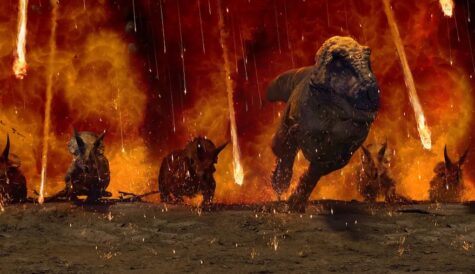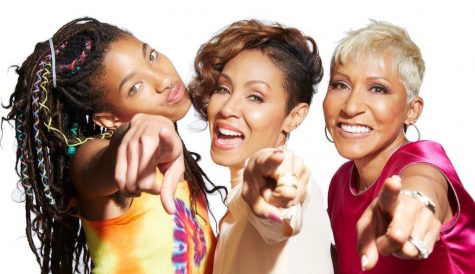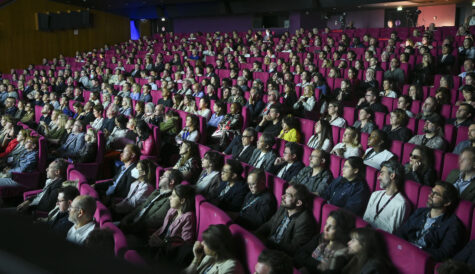
After more than 35 years of operation, TBI is closing its doors and our website will no longer be updated daily. Thank you for all of your support.
TBI Weekly: Five AI myths busted
Guy Gadney, co-founder and CEO of Charisma.ai, the company behind the artificial intelligence toolkit used in projects such as Sky’s recent interactive TV drama Bulletproof, debunks five myths about the emergent technology’s future uses.
The use of artificial intelligence (AI) is rapidly on the rise in the international television industry – and during this pandemic where we’ve seen numerous examples of incredible virtual projects created alongside TV shows. But like any new technology introduced to this world, there’s an adoption curve to be considered – and shifting attitudes and perception takes time. Remember when TV executives first dismissed DVDs back in the early 2000s? Well, they did until the cheques started rolling in!
When it comes to AI, the horses are now leaving the pen, so getting on the front foot as a producer, broadcaster or SVOD is going to be more important than ever to stay ahead of the pack. However, common myths still remain, often reinforced by numerous Hollywood portrayals of this technology. So below are my top five AI myths debunked, bringing some fact to fiction and outlining why ignoring the most creative of technologies could be at your peril:
Myth #1: AI won’t impact the television industry
“It’s new technology so we don’t need to know about it right now – we’re too busy making linear television”. I’ve actually heard this line before from a couple of UK production companies, and it always surprises me given the huge demand for content innovation in the television industry. The truth is, AI is already having a huge effect on the industry, whether that’s through content recommendation tools on Netflix and Amazon Prime Video, or virtual production, which accelerated enormously due to the pandemic. AI is already a feature throughout the industry, and the key is to now use it for a qualitative and competitive advantage.
Myth #2: Deepfakes (and Tom Cruise deepfakes) are easy to create
We all saw the ‘@DeepTomCruise’ TikTok account recently and marvelled at how the content creators produced those incredible AI-generated clips of the Hollywood star playing golf and embarking on other activities. Some of the results were simply mind-blowing – and the fact that the commercial tools used to identify deepfakes didn’t pick up on this account speaks volumes. However, there’s still a general perception that this is some sort of easy, automatic production process. The reality? These sort of deepfakes take a lot of manual work to produce. We’re not at the point where we get believable, true-to-life performances automatically; what you see on YouTube is hand-crafted as a collaboration with AI, it’s not automatic and a lot of work goes into it.
Myth #3: AI will replace jobs
On a similar note, we aren’t (yet) at a stage where robots will take over the world. Like any new technology (think Video Killed The Radio Star), AI has had its fair share of doom and gloom headlines. But in my mind, AI should be viewed as an enabler of jobs, not a replacer. When the movie Avatar was released, new ground was broken with a hybrid of physical actor performances mixed with incredible virtual technology. It was a key moment for all creative industries – but did this new technology replace anyone? No. Whole new animation departments were opened, digital jobs were created and actors were still… well… acting. Importantly, everyone still got paid. So the notion that AI is the End of Days for the creative industries jobs market is not true, and in fact is the beginning of a new dawn for creativity.
Myth #4: TV shows will soon be greenlit by AI commissioners
We’ve all – at some stage – clicked on a shiny new Netflix programme that was suggested to us by a recommendation engine. And it’s no secret that large-scale companies including Amazon, Facebook and Spotify all utilise AI, machine learning and data science to interact with the end user to influence their content choices. But is there actually any danger of SVOD services going one step further and commissioning shows on the basis of performance data and ratings? As it stands, I believe there isn’t. The simple fact is AI can’t do surprises; AI can’t find you that The Queen’s Gambit or surprise break-out hit. You still need that all-important ‘gut feel’ from a commissioner to make that final decision. While AI can be a useful commissioning tool, in this realm it will never be a replacer.
Myth #5: AI speech isn’t good enough quality – and everyone just sounds like Alexa
This is an interesting one. There’s a perception you can’t teach an AI voice to perform emotionally or AI voices are just monotonous in tone. But behind the scenes, this technology is evolving at light speed. For instance, techniques are already being used by documentary makers to capture narrators’ voices in the studio. And indeed the actor’s voice for our Bulletproof interactive drama for Sky was brought to life using AI. Whole passages needn’t be spoken and if actors miss any lines there’s now no need for them to return to the studio. AI can pick it up for them. The end result is seamless and a real game changer for the post-production process.





